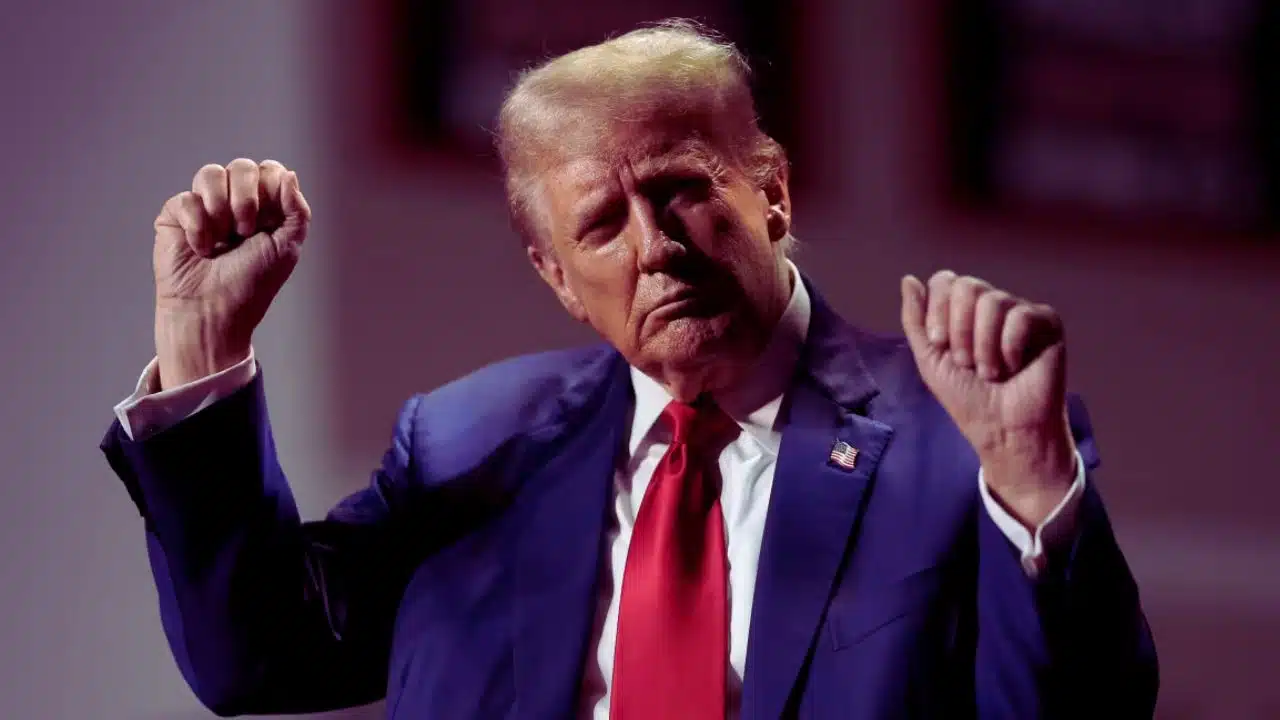In a historic political upset, former President Donald Trump has triumphed over Vice President Kamala Harris to secure his return to the White House, making him the first president since Grover Cleveland to serve two non-consecutive terms. This election marked a dramatic journey, filled with unforeseen twists, tense political battles, and even two assassination attempts on Trump’s life, underscoring the polarizing atmosphere of the 2024 presidential race.
Trump’s Path Back to the Presidency: A Two-Year Campaign
Trump announced his intention to run on November 15, 2022, only days after the midterm elections, setting the stage for one of the most challenging presidential campaigns in modern history. This campaign was characterized by his emphasis on what he called the “failures” of the Biden-Harris administration, particularly in areas such as inflation, border security, and economic stability.
Throughout the GOP primary season, Trump faced a crowded field of contenders, but his dominance in the Republican Party remained unmatched. From the beginning, he held a significant lead over his opponents, who, one by one, ultimately endorsed him as the party’s candidate. Trump’s victory in each primary reinforced his role as the frontrunner, cementing his popularity and strong support base among Republican voters.

Unexpected Turn: Biden Exits the Race, Harris Takes the Lead
Initially, Trump’s opponent was President Joe Biden, who had announced his intention to seek re-election. However, following a difficult debate performance in June 2024, Biden faced mounting internal pressure from his party’s leadership to reconsider his campaign. Just weeks after this controversial debate, Biden made a public announcement via social media, formally endorsing Kamala Harris as the Democratic presidential candidate and effectively bowing out of the race.
The timing of Biden’s decision came on the heels of the Republican National Convention, where Trump and his running mate, Senator J.D. Vance of Ohio, officially accepted the GOP nomination. The change to a Harris-led ticket set the stage for a direct and heated race between her and Trump, with both candidates offering starkly different visions for America’s future.
Assassination Attempts Shake the Campaign Trail
The intensity of the 2024 campaign season escalated when Trump survived two assassination attempts. The first occurred at a rally in Butler, Pennsylvania, on July 13. While presenting a chart that highlighted the rise in illegal immigration under the Biden-Harris administration, Trump was suddenly struck by a bullet that grazed his right ear. The assailant, later identified as Thomas Matthew Crooks, was quickly apprehended by Secret Service agents. In a post-incident statement, Trump credited the large chart he had been holding with saving his life, as it absorbed much of the bullet’s impact.
Then, in September, a second attempt unfolded at Trump’s West Palm Beach golf course. Ryan Wesley Routh, armed with an AK-47-style rifle, concealed himself in the bushes near the course. Trump was quickly evacuated from the scene by Secret Service agents, emerging unharmed once again. Following this second incident, Trump publicly blamed the “rhetoric” of Biden, Harris, and their supporters, claiming it incited violence against him. Trump described this rhetoric as dangerous, stating that his adversaries were attempting to tarnish his efforts to “save the country.”
Two Visions for America’s Future: Policy Differences and Campaign Rhetoric
Trump’s campaign focused on reinstating many of the policies he had implemented during his first term. His platform included commitments to strengthen border security, control inflation, revive manufacturing, and adopt a strong “America First” approach to international relations. His closing message to voters was clear and straightforward: “Harris broke it. Trump will fix it.”
In contrast, Harris’s campaign was anchored in a message of protecting democracy and securing fundamental rights. Harris warned that Trump’s return to office posed a risk to democratic institutions, often highlighting his alleged support for a national abortion ban, which Trump consistently denied. The escalating rhetoric added intensity to the final weeks of the campaign, with Trump making a bold appearance at a McDonald’s drive-thru in Pennsylvania, taking a jab at Harris’s previous claim of having worked at the fast-food chain.
The divisive tone was mirrored on the Democratic side as well. Harris, along with other prominent Democrats, compared Trump to historical authoritarian figures, with Harris suggesting Trump represented an existential threat to the democratic principles of the nation. The language used by both camps only heightened tensions in an already charged election atmosphere, with Biden, just days before Election Day, referring to Trump’s supporters as “garbage.”
A Broad Coalition: Trump’s High-Profile Endorsements
Despite the polarized political climate, Trump managed to secure endorsements from prominent Republican figures and unlikely allies from different political backgrounds. Among his supporters were former Democrats Robert F. Kennedy Jr. and Tulsi Gabbard, both of whom aligned with Trump on specific policy issues, reflecting a cross-partisan coalition that few anticipated. In addition, business moguls such as Elon Musk, CEO of Tesla and SpaceX, and Howard Lutnick, CEO of Cantor Fitzgerald, publicly supported Trump’s campaign. Lutnick disclosed that many Wall Street leaders privately committed to backing Trump, underscoring the appeal of his pro-business policies.
Legal Battles and the Courts: Trump’s Ongoing Challenges
Trump’s 2024 campaign unfolded under the shadow of numerous legal proceedings, with four separate indictments levied against him during his candidacy. Among these, charges included alleged mishandling of classified documents at his Mar-a-Lago estate and interference in the 2020 election. Trump and his legal team consistently denied the allegations, asserting they were politically motivated attempts to undermine his campaign.
In a significant ruling, a federal judge in Florida dismissed the classified documents case, citing the improper appointment of Special Counsel Jack Smith, who had been tapped to investigate Trump’s handling of government records. The U.S. Supreme Court also ruled in Trump’s favor when Colorado sought to remove him from the ballot under the 14th Amendment, impacting similar efforts in other states. In yet another case, Trump faced a New York jury over allegations of falsifying business records, resulting in a conviction that is currently under appeal.
Civil Cases and Financial Penalties
The legal challenges extended to civil court as well. New York Attorney General Letitia James brought a civil fraud case against Trump, resulting in a $450 million judgment. Trump has appealed the ruling, with legal analysts suggesting the possibility of a reduced judgment or complete reversal. Additionally, in a defamation lawsuit by E. Jean Carroll, Trump was ordered to pay over $80 million after a jury determined he had damaged Carroll’s reputation by denying her accusations of assault. Trump’s appeal of this verdict is still ongoing, with his legal team arguing it was a violation of his rights to free speech.
A Historic Victory Amidst Turmoil
Trump’s 2024 election victory marks one of the most significant political comebacks in U.S. history, emphasizing his unique resilience and the fervent loyalty of his supporters. The polarized environment, legal entanglements, and multiple assassination attempts only seem to have solidified his base, underscoring the divisions that have come to define American politics. As Trump prepares for his second inauguration, the country is on edge, anticipating the policies and leadership style that will characterize his return to the Oval Office.
This moment also highlights the power dynamics at play in American politics, with Trump emerging victorious despite multiple legal and political obstacles. His campaign’s message of restoration, coupled with his appeal to traditional conservative values, has resonated with a substantial portion of the electorate, promising a continuation of the debates that have shaped the nation’s recent political landscape.






































